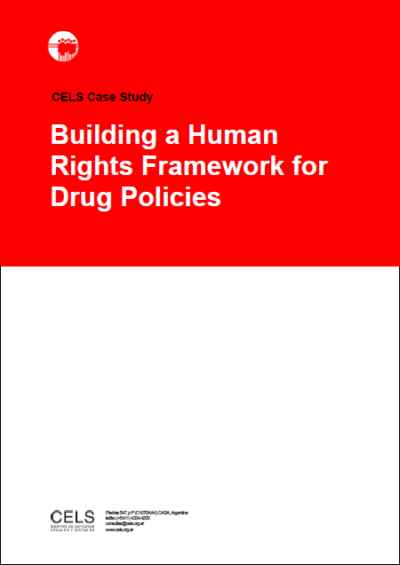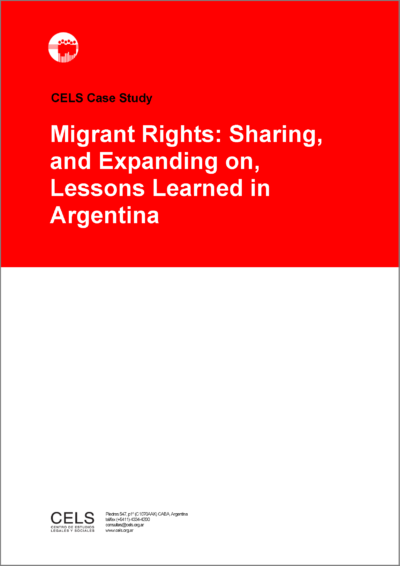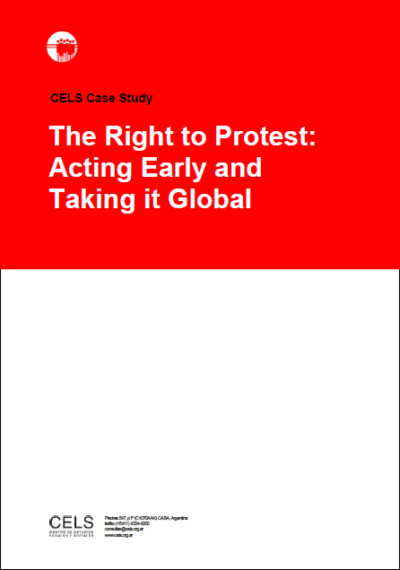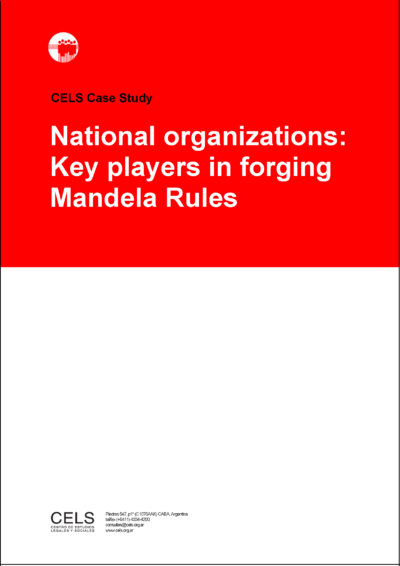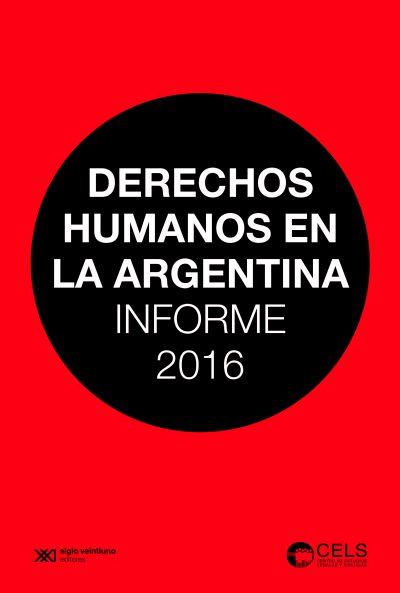Petition for the Declaration of Unconstitutionality of the Appointments of Lijo and García-Mansilla
The decree in question constitutes a clear violation of the National Constitution and a serious affront to the separation of powers and judicial independence. In response, together with the Civil Association for Equality and Justice (ACIJ), the Institute for Comparative Studies in Criminal and Social Sciences (INECIP), and Poder Ciudadano, we filed an action for constitutional protection (amparo).
María José Guembe assumes the presidency of CELS
CELS decided to make a change in the leadership of its board of directors, bringing in members from diverse backgrounds. Sofía Tiscornia, who has served as president for the past two and a half years, will continue as an active member.
Supreme Court: we oppose the nominations of Lijo and García-Mansilla
We have submitted to the National Ministry of Justice our observations regarding the nominations proposed by the Executive Branch for the Supreme Court of Justice of the Nation (SCJN). We believe the proposed candidates’ profiles are incompatible with the required standards to serve on the highest court.
Democracy is improved with more democracy
In Argentina we need to collectively build a society and a political system based on respect for diversity and without violence, based on the consensus built with Nunca Más (Never Again), but we need to improve our way of life with expansion of rights always at the forefront. Joint statement with dozens of civil society organizations in our country.
Imparable 2023: a festival to debate, reflect and expand Argentina’s democracy
On Sunday, November 5th, thousands of people came together at the Malvinas Argentinas stadium in Buenos Aires to listen, debate and dance. Among families, friends, activists, different generations and organizations, we engaged in a grand collective conversation to imagine a common future.
2023 Emilio Mignone International Human Rights Award: nominations are open
Candidates will be admitted from July 10 to September 15, 2023. The award is inspired by the life and work of a founding member of CELS.
Más que nunca’s book release at teatro picadero
With Lef Nawel, Juan Ruocco, Dina Sánchez, Ángela Urondo Raboy, and Paula Litvachky on stage, before a full audience, we delved into the debates put forth in the new book published by CELS and Siglo XXI.
Urban drug trafficking, migrants, and the defense of activists: some of Cels’ topics for #fmdh23.
Between March 20 and 24, we will participate in the 3rd World Forum on Human Rights, organized by UNESCO, in Buenos Aires. As members of several committees, CELS is participating in more than a dozen activities for exchange and debate.
2023: shaping the future of democracy with human rights
Celebrations and debates will mark the 40th anniversary of Argentina’s democracy on December 10. From CELS, we are proposing content and spaces for participation to foster the collective momentum to navigate the challenges we are facing today.
Message from CELS
Horacio Verbitsky presented his apologies and requested a leave of absence. With this granted by the Board of Directors, vice president Sofia Tiscornia is now CELS’ acting president.
Statement from CELS Workers on Privileges
Through this message we reject all type of favoritism or privilege-led action.
New Book on Human Rights During the Pandemic
POST is our latest contribution to analyzing how Covid-19 has critically affected human rights, heightening existing factors of previous situations of violations in a rapidly transforming panorama.
CELS Regrets the Passing of Allen “Tex” Harris
Tex played a crucial role in compiling and disseminating information about Argentinian human rights violations abroad during the last civilian and military dictatorship.
As of February 1, 2020, Paula Litvachky is CELS’s new executive director
Towards the end of 2019, CELS decided to make a rotation in management and the board of directors named Paula Livatchky as the new executive director.
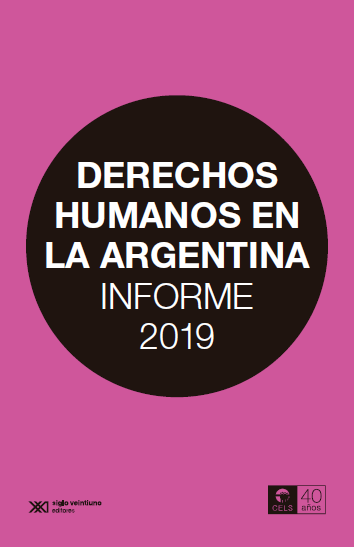
Human Rights in Argentina: 2019 Report
Autor/a: CELS
224 pgs.
ver más
Presentation of 2019 report on Human Rights in Argentina
CELS’ latest report on human rights in Argentina is now available. This edition coincides with the 40th anniversary of our institution, founded during the darkest days of the last dictatorship by relatives of detained, kidnapped and disappeared youths.
Local community funding: what’s possible in Latin America?
Shifting to local community funding is possible in Latin America, as our incipient experience shows. Can more organizations make such similar shifts in a sustainable way?
Human Rights in Argentina: Our 2017 report in broad strokes
Argentina is known globally for its hard-fought Memory, Truth and Justice process over the crimes committed during the 1976-1983 dictatorship. But numerous other human rights achievements have been enshrined in the country’s constitution, laws, regulations and jurisprudence over the years. Today, some of those are at risk.
In defense of the agreements forged in democracy
On Monday, December 4, the 2017 Annual Report edited by Siglo XXI will become available. The prologue, which we are sharing in advance, calls attention to decisions, measures and events that adversely affect critical items on the human rights agenda as well as protection mechanisms. The government response to grave incidents, repeated incidents of repression and discourses about present-day threats and episodes from the past put the human rights consensuses achieved in Argentina on alert. These have been compounded by judicial decisions that take aim at some of the pillars of democracy. This situation requires safeguarding human rights principles from the dynamic of overall polarization.
Human Rights in Argentina: 2017 Report
Autor/a: CELS
285 pgs.
ver más
Building a Human Rights Framework for Drug Policies
Autor/a: CELS
6 pgs.
ver más
Migrant Rights: Sharing, and Expanding on, Lessons Learned in Argentina
Autor/a: CELS
4 pgs.
ver más
The Right to Protest: Acting Early and Taking it Global
Autor/a: CELS
5 pgs.
ver más
National Organizations: Key Players in Forging Mandela Rules
Autor/a: CELS
4 pgs.
ver más
Human Rights in Argentina: 2016 Report
Autor/a: CELS
336 pgs.
ver más
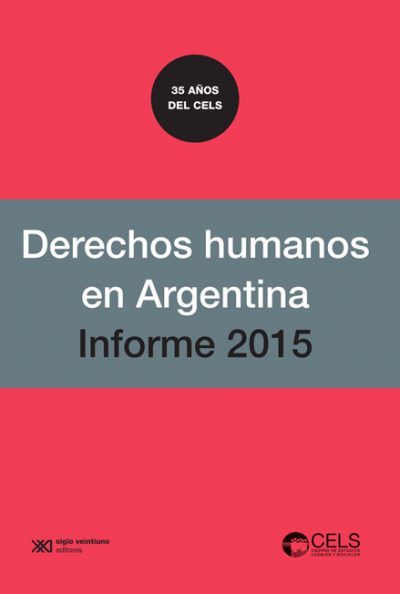
Human Rights in Argentina: 2015 Report
Autor/a: CELS
640 pgs.
ver más




